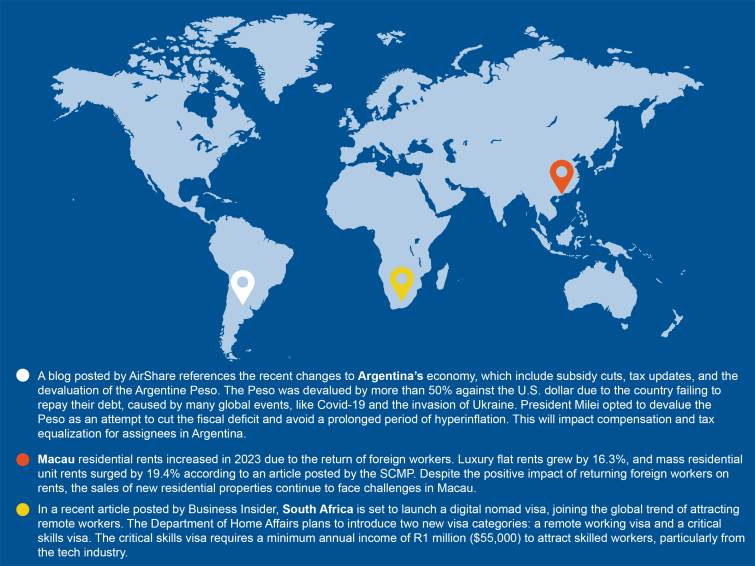CapRelo Insider February 2024

Canada Extends Foreign Home Buyer Ban
Canadian Prime Minister, Justin Trudeau, and Minister of Finance, Chrystia Freeland, have announced a two-year extension to the existing ban on foreign ownership of Canadian housing. The ban, initially set to expire on January 1, 2025, will now be extended until January 1, 2027. The move is in response to concerns about foreign money inflating residential real estate prices in Canada, particularly in major urban centers, leading to worries about housing affordability for Canadians.
The government aims to use various tools to make housing more affordable, and the extension is part of a broader economic plan that includes initiatives to build more homes and increase homeownership opportunities for Canadians. The ban specifically prohibits foreign commercial enterprises and individuals who are not Canadian citizens or permanent residents from purchasing residential property in Canada.
The Impact: By restricting foreign ownership, the government aims to curb speculation and ensure that domestic buyers have better access to the housing market. Relocating employees who were already in the process of relocating and had plans to purchase a home in Canada may need to adjust their expectations or plans, based on the evolving housing market conditions. These employees may need to explore alternative housing options.
Navigating U.S. Residual Tax Challenges: Strategies for Double Tax Relief
An article written by AIRINC, explores the challenges faced by U.S. citizens, particularly those working abroad, due to the unique citizenship-based worldwide individual taxation system in the United States. While citizens within the country experience minimal impact, those living abroad encounter compliance burdens, potential double taxation, and a loss of benefits in no-or low-tax countries.
The article discusses the complexities of home country tax residency, emphasizing that breaking residency is not always straightforward and depends on various factors.
For U.S. citizens and Green Card holders living outside the U.S., AIRINC highlights the risks of double taxation and presents two mitigation options: the Foreign Earned Income Exclusion (FEIE) and the Foreign Tax Credit. Additionally, it outlines tax treaty rules that, if met, can exempt income from host country taxation.
The Impact: The 2018 U.S. tax reform shifted corporate taxation to territorial taxation, but the elimination of citizenship-based taxation for U.S. citizens living abroad is unlikely. Factors such as the small number of taxpayers in this category, potential revenue loss, and concerns about high-income individuals avoiding taxation discourage such a change.
Global Mobility professionals should anticipate that countries may make breaking tax residency more challenging to boost tax revenue, directly impacting Mobility budgets. Effectively estimating and preparing for these costs is crucial for running a successful mobility program. It’s important to note that at CapRelo, while we closely monitor these tax updates, we are not professional tax advisors.
Hybrid Workforce Model Still Developing
A recent HRO Today Research Flash Report, sponsored by CapRelo, explores the evolving landscape of hybrid work models within organizations. The study, conducted between November 21 and December 15, 2023, surveyed senior Human Resources (HR) leaders, focusing on their management of hybrid workforce policies, requirements for in-office attendance, and strategies for encouraging employees to return to the office.
The report suggests that while the full-time in-office work trend has declined, hybrid work is becoming more prevalent. Many organizations are wrestling with policy consistency, geographic requirements, and strategies to incentivize employees to return to the office. The findings provide insights for HR professionals and business leaders navigating the evolving landscape of hybrid work.
The Impact: Remote and hybrid work can have unique implications including the need to adjust training and development methodologies, managing the well-being of employees, and finding the right flexibility in working arrangements through onsite vs. virtual meetings. If you’re facing challenges accommodating new work arrangements in your program, a relocation management company (RMC) like CapRelo can help. CapRelo specializes in providing support, expertise, and flexibility to companies finding the right balance between remote and on-site work. For more information, contact us here!
Global Mobility Radar
CapRelo’s Mobility Radar provides valuable insights into trends worth monitoring. This month, we have detected important global mobility updates in Argentina, China, and South Africa.



